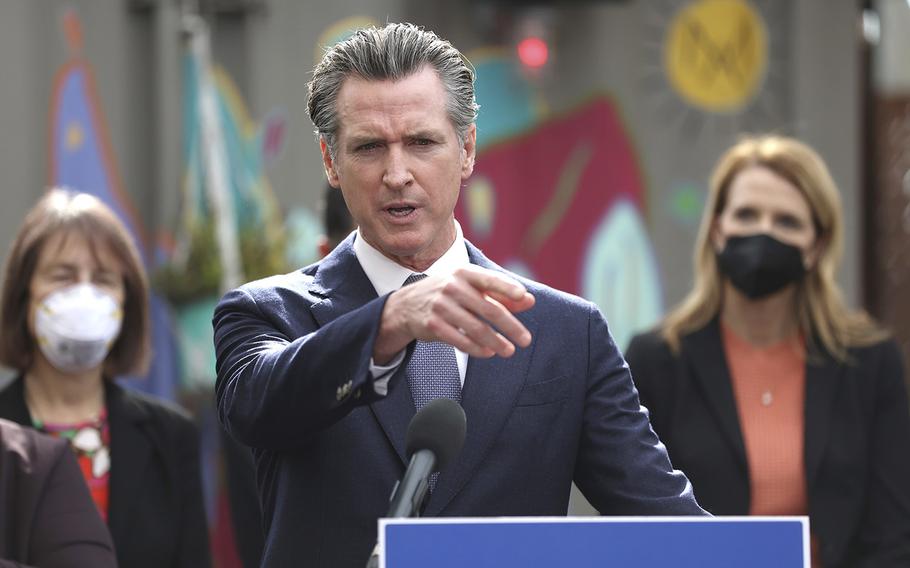
California Gov. Gavin Newsom in February 2022 in San Francisco. (Justin Sullivan/Getty Images/TNS)
Stars and Stripes is making stories on the coronavirus pandemic available free of charge. See more stories here. Sign up for our daily coronavirus newsletter here. Please support our journalism with a subscription.
SACRAMENTO, Calif. (Tribune News Service) — A federal judge on Wednesday paused enforcement of a new California law that punishes doctors for spreading false information about COVID-19 to their patients.
In doing so, Senior Judge William Shubb said the measure’s definition of “misinformation” was “unconstitutionally vague” under the due process clause of the 14th Amendment.
A group of doctors, along with two organizations, are suing state officials in separate actions in the United States District Court in Sacramento. They had asked Shubb to stop enforcement of the rule while their cases continue in court.
The law went into effect January 1. It says doctors who share false information about COVID-19 treatment options and vaccines, whether they did so deliberately or not, could be disciplined for “unprofessional conduct.”
In an order Wednesday, Shubb criticized the law’s definition of “misinformation,” which is “false information contradicted by contemporary scientific consensus contrary to the standard of care.”
Shubb, who called the definition “nonsense” at a court hearing Monday, said in Wednesday’s order that it was “grammatically incoherent.”
Beyond that, Shubb’s order also criticized the phrase “contemporary scientific consensus,” saying that it doesn’t have an established meaning in the medical field.
“The statute provides no clarity on the term’s meaning, leaving open multiple important questions,” the order said. “For instance, who determines whether a consensus exists to begin with? If a consensus does exist, among whom must the consensus exist (for example practicing physicians, or professional organizations, or medical researchers, or public health officials, or perhaps a combination)?”
That lack of clarity, the judge added, makes it impossible to determine what the new law prohibits.
The law stemmed from a bill, AB 2098, introduced last year by Assemblyman Evan Low, a San Jose Democrat. It said the “spread of misinformation and disinformation about COVID-19 vaccines has weakened public confidence and placed lives at serious risk.” As of Monday, the Medical Board of California and the Osteopathic Medical Board of California had not disciplined anybody under the law, according to board representatives. Doctors found to have committed unprofessional conduct could lose their licenses.
When Gov. Gavin Newsom signed the bill in September he called it “narrowly tailored” and said it only applies to conversations doctors have with their patients about COVID-19. Newsom, Attorney General Rob Bonta and representatives of boards that discipline doctors of medicine and osteopathy are being sued in the cases.
Opponents have raised free speech concerns in their challenge of the law. They said it had created a “chilling effect” on conversations between doctors and patients because of the threat of possible discipline. In court on Monday, an attorney representing five doctors in one of the cases, said the rule was meant to silence people who have different views from the state.
That said, Shubb did not address the law’s constitutionality under the First Amendment in the order. Instead, saying the concerns about its vagueness were enough to put the rule on hold.
©2023 The Sacramento Bee.
Visit sacbee.com.
Distributed by Tribune Content Agency, LLC.